The far-right Freedom Party—an ally of Marine Le Pen’s National Front in France and one of the emboldened cluster of populist right-wing parties making big gains across the Continent—took as much as 26 percent of the vote in Austria’s elections this weekend.
The result could see the Freedom Party enter into a coalition with the right-wing Austrian People’s Party, led by Sebastian Kurz, 31, who is set to become the world’s youngest sitting head of government.
But what is the Freedom Party? And what will the result mean for the future?
Long-Established Outsiders
The Freedom Party is one of Europe’s older surviving right-wing populist parties. Founded in 1955, it has even had one spell as a partner in a coalition government. It joined the center-right People’s Party in power in 2000, which led to Austria briefly facing European Union sanctions.
Like many other European populist parties, the Freedom Party is strongly anti-immigration. “Austria is not a country of immigration,” the party says in its program statement. “This is why we pursue a family policy centered around births.” Its policies include freezing migrants out of welfare payments. Unlike some extreme-right groups, however, it does not campaign for legal immigrants already in the country to be repatriated.
The Freedom Party is strongly anti-Islam. It has long campaigned for a ban on face veils—and this year it got its way, with a ban going into force in Austria on October 1. In the European Parliament, the party is aligned with two fellow anti-Islam parties, the National Front in France and Alternative for Germany, which also made significant gains in the recent German elections.
The Freedom Party has been able to capitalize on the European refugee crisis and topped opinion polls throughout much of 2015 and 2016 as it picked up protest voters unhappy with an influx of asylum seekers from the Middle East and Africa.
Also a factor in the group’s recent strength has been its promotion of clean-cut, superficially charming figureheads adept at making its positions seem reasonable. In the country’s presidential election last year, the party came in a close second (the winner was an independent Green politician) with its candidate Norbert Hofer, a man one critic described as a “wolf in sheep’s clothing.”
Current party leader Heinz-Christian Strache, blue-eyed and inoffensively handsome, dismissed reports from Süddeutsche Zeitung about his past ties to the neo-Nazi scene as youthful folly, saying he now condemns all extremism. “I was a seeker, I saw a lot of things,” he said.
Growing Influence on Government
What the party would do in a coalition would partly depend on what it is able to extract during negotiations. Aside from pushing for a crackdown on immigration and Islam, the party has strong views on Austria’s policy toward the EU. It is strongly Euroskeptic and is opposed to deeper EU integration.
It would also like Austria to align itself more closely with the Visegrad Group—an alliance of central European countries whose intolerant line on refugees sets it apart from some more liberal Western European states.
Alternatively, Kurz could choose to reignite his party’s previous coalition with the center-left Social Democrats, albeit with a shift in the balance of power. (Before the election, the Social Democrats were the largest party.)
Even if that’s the case, the Freedom Party will wield influence and will be listened to some of the time when it shouts from the sidelines.
It has already helped to shift the debate in Austria on immigration and integration firmly to the right. Kurz achieved electoral success partly by adopting some of the Freedom Party’s positioning on the issue, and his proposals include new funding and rules designed to regulate mosques.
As Cas Mudde, a political scientist who studies right-wing populism, put it on Twitter: “Copying radical right policies does NOT marginalize radical right parties. It keeps them relevant.”
[Disclaimer]









